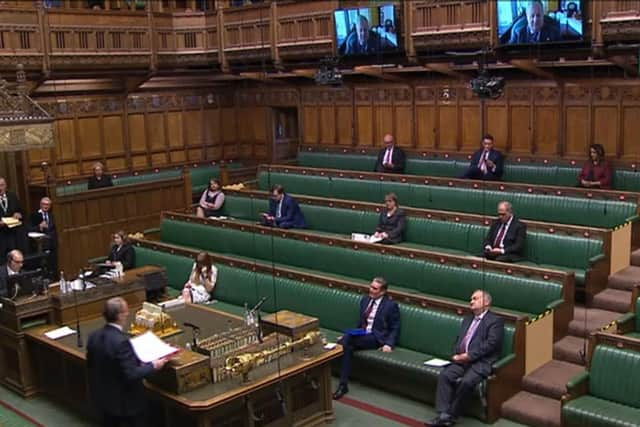Internal Market Bill: Convention means nothing as UK Government prepares to ignore Scottish Parliament – Ian Swanson


It's not just the SNP who are against this Bill – Labour, the Lib Dems and the Greens have also condemned it. Indeed, the Tory MSPs were the only ones to back the Bill at Holyrood.
The Northern Ireland Assembly has also passed a motion rejecting it and the Welsh Assembly is expected to do the same.
Advertisement
Hide AdAdvertisement
Hide AdBut it will make no difference. The UK Government is determined to pass the legislation regardless.
Tories claim that far from being a “power grab” the Bill represents a “power surge” for the Scottish Parliament because a host of areas which were previously an EU responsibility will now be transferred to Holyrood’s ambit. But the legislation ranges far wider than dividing up oversight of numerous different activities.
UK can bypass Holyrood
The Bill is aimed at preventing barriers to trade among the four nations of the UK, but rather than providing for agreed minimum standards which would apply everywhere, the proposals insist that anything acceptable for sale in one part of the UK must automatically be accepted in the others, prompting fears that if Boris Johnson’s Government should opt for lower environmental or food standards, the other nations would be unable to resist them.


Under the Bill, Westminster will also get the power to bypass the Scottish Parliament to fund projects in Scotland itself and instead of Scotland receiving millions of pounds direct from Europe, the UK Government will decide how the replacement funding is allocated.
Advertisement
Hide AdAdvertisement
Hide AdAnd “state aid” powers to decide on subsidies is to become a Westminster responsibility, robbing Scotland of an opportunity to help shape its own economy.
When devolution was introduced back in 1999, a convention was laid down that Westminster should not legislate on devolved areas of responsibility without the agreement of the relevant devolved administration. The so-called Sewel convention, named after the junior minister who helped steer the devolution legislation through Westminster, worked smoothly for years and, before Brexit, the Scottish Parliament had only denied its consent on one occasion.
Ignored, undermined and over-ruled
But when Holyrood voted to withhold consent from the EU Withdrawal Bill in 2018, the UK Government ignored it and passed the legislation anyway.
Then in January this year, the Welsh and Northern Ireland Assemblies joined the Scottish Parliament in refusing consent for the Withdrawal Agreement, but again Westminster passed it regardless.
Advertisement
Hide AdAdvertisement
Hide AdAnd thanks to a Supreme Court ruling in 2017, nothing can be done to stop that being repeated now. The court decided unanimously that despite the Sewel convention having been incorporated into law in the 2016 Scotland Act, it remained just a “political convention” which the UK Government was not legally obliged to follow and which could not be enforced by the courts.
It's 20 years since Donald Dewar, Scotland's first First Minister, died tragically after just 17 months in the job. He did not have time to show in practice the full range of what he wanted to do with the devolution he delivered. But one thing is sure – he didn't set up a Scottish Parliament to see it ignored, undermined and overruled by a UK Government, especially not one led by Boris Johnson.
A message from the Editor:
Thank you for reading this article on our website. While I have your attention, I also have an important request to make of you.
The dramatic events of 2020 are having a major impact on many of our advertisers - and consequently the revenue we receive. We are now more reliant than ever on you taking out a digital subscription to support our journalism.
Subscribe to the Edinburgh Evening News online and enjoy unlimited access to trusted, fact-checked news and sport from Edinburgh and the Lothians. Visit www.edinburghnews.scotsman.com/subscriptions now to sign up.
Subscribe to scotsman.com and enjoy unlimited access to Scottish news and information online and on our app. Visit www.scotsman.com/subscriptions now to sign up.
By supporting us, we are able to support you in providing trusted, fact-checked content for this website.
Joy Yates
Editorial Director
Comment Guidelines
National World encourages reader discussion on our stories. User feedback, insights and back-and-forth exchanges add a rich layer of context to reporting. Please review our Community Guidelines before commenting.